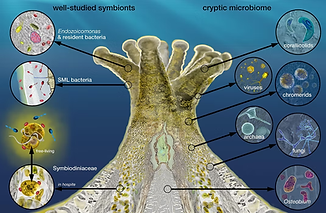
Recent News
New Feature
Aboard the UAE research vessel Jaywun, NYU scientists — including the Amin Lab — uncover thriving microbial life in the Arabian Gulf’s extreme conditions. Read NYU Biologists Study Marine Life on UAE Research Ship.
New Feature
Read more in Red Alert — an article on how warming waters and human activity are fueling algae blooms that impact the environment, marine life, and public health.
New Feature
Explore how scientists are uncovering microbes’ power to combat climate change in The Microbial Masters of Earth’s Climate.
New publication
A new paper that Salah and Shady authored is now out at RSC Advances!
Update
Many lab members presented posters that showcase their latest research findings at the CGSB symposium XIII on campus
New publication
A chapter in the coral reef microbiome book that Amin and Shady authored is now out!
For full list of exciting news, visit our News page.
Our lab studies the role microbiomes play in the adaptation and evolution of important marine eukaryotes, particularly phytoplankton and corals. Using multiomics and physiological and phenotypic techniques, we examine how these microbiomes influence their hosts' physiology, evolution, response to the environment, and the effects of climate change and anthropogenic influences on these host-microbiome relationships.
Our lab is also extensively using cutting-edge techniques to study microbial ecology and beyond. We use microfluidics to study phytoplankton microbiomes at the single-cell level. We also use metabolomics and develop metabolomics techniques to study a wide range of questions, including host-microbiome interactions, saliva metabolomics, drug metabolism in the human gut and model system metabolomics.




